Today, institutions use higher education digital marketing strategies like social media campaigns, search engine optimization (SEO), email automation, and video content to capture student attention and guide them through the application process.

As someone with over a decade of experience in education marketing, I’ve witnessed firsthand how rapidly the landscape has transformed, particularly with the rise of higher education digital marketing strategies.
In the upcoming year, 2025, this shift will become even more pronounced as institutions increasingly adopt personalized, data-driven approaches to meet the evolving needs of students.
At its core, education marketing is more than just promoting courses or programs—it’s about creating meaningful connections between institutions and prospective students through targeted strategies. With over 80% of students expecting personalized content, digital marketing for higher education is no longer optional but essential.
The global digital advertising spend is projected to surpass $700 billion by 2025, underscoring the need for institutions to leverage social media, SEO, video marketing, and AI-driven chatbots to stay competitive.
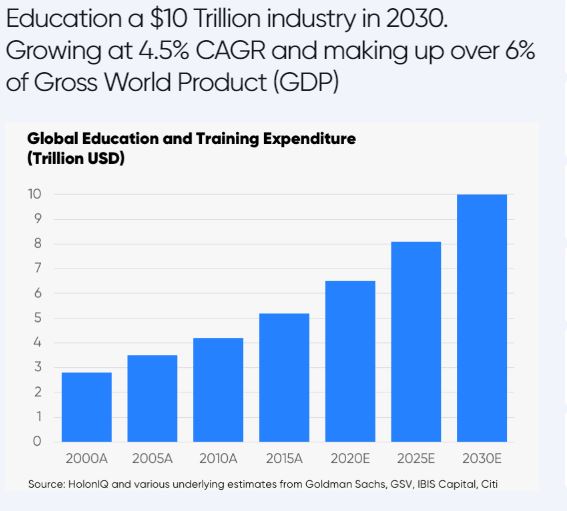
The importance of higher education marketing strategies is highlighted by the rising expectations of students. According to recent reports, 72% of prospective students prefer virtual tours and video content over traditional brochures, and 65% rely on social media when deciding where to apply.
As we approach 2025, higher education marketing will increasingly rely on these digital channels to drive student engagement and improve enrollment outcomes.
Successful institutions will focus on marketing for education that is adaptable, data-driven, and personalized, ensuring they stand out in a highly competitive market.
What is Education Marketing?
After working in higher education marketing for over a decade, I’ve seen the landscape evolve dramatically. Initially, education marketing was primarily about promoting programs through brochures, fairs, and direct mail.

However, with the rise of technology and the increasing expectations of students, the focus has shifted towards creating personalized, data-driven experiences. Today, the purpose of marketing for education is not just to attract students but to build long-term engagement by delivering value through every interaction.
Education marketing is the strategic approach used by educational institutions to attract, engage, and enroll prospective students by promoting their programs, values, and offerings.
It involves the use of tailored content, digital channels, and data-driven tactics to reach a broad audience, including students, parents, and stakeholders, ultimately building a strong and recognizable brand for the institution.
Unlike traditional marketing, marketing for education requires a deep understanding of the unique needs of students and the academic community, emphasizing personalized, relevant experiences.
Over the years, higher education marketing has evolved significantly, particularly with the rise of digital platforms. What once relied heavily on brochures, mail campaigns, and physical events has transformed into a robust, online-driven effort.
Today, institutions use higher education digital marketing strategies like social media campaigns, search engine optimization (SEO), email automation, and video content to capture student attention and guide them through the application process.
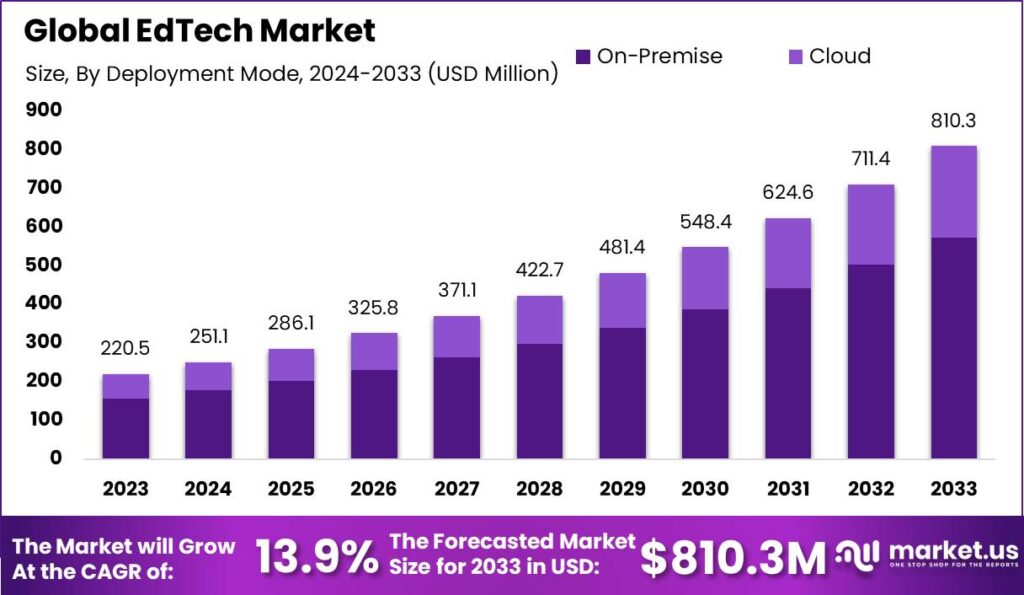
Personalization, driven by data analytics and behavioral insights, plays a crucial role in creating targeted campaigns that resonate with potential students.
A key difference between education marketing and traditional marketing is its focus on building trust and long-term relationships. Prospective students are not simply buying a product; they are making one of the most important decisions of their lives.
As a result, institutions must present themselves as credible, supportive, and valuable through authentic storytelling and student-centered content.
In 2025, higher education digital marketing will be essential for institutions to remain competitive. The use of digital marketing for higher education has grown exponentially, with data showing that over 85% of students now begin their search for a college or university online.
This digital shift has made it crucial for institutions to adopt a strategic blend of SEO, social media, video content, and AI-driven tools like chatbots to engage prospective students effectively.
Reports indicate that video content alone accounts for 72% of student engagement, while personalized email campaigns are driving 50% higher ROI than traditional methods.

The evolution of higher education marketing strategies reflects the changing expectations of students, who demand more personalized and immediate responses. In the past, marketing was a one-way communication, focused on pushing information.
Now, education marketing must be interactive, leveraging analytics and real-time data to understand and respond to student needs. By 2025, institutions that can offer virtual campus tours, personalized course recommendations, and automated support will outperform those still relying on traditional methods.
The future of higher education marketing is not just about digital presence; it’s about creating an experience that resonates with individual student needs, ensuring institutions can attract, engage, and retain a diverse student body in an increasingly competitive market.
The Changing Landscape of Education Marketing
The landscape of education marketing has transformed, driven by the rise of digital tools and platforms that have reshaped how institutions connect with prospective students.

The days of relying solely on traditional methods like print ads or in-person events are behind us. Today, digital marketing for higher education is about leveraging advanced technologies to engage students in real-time, meet them where they are, and offer personalized experiences.
The impact of technology on marketing for education has been undeniable, particularly in the post-COVID world. With the rapid shift to online and hybrid learning, institutions were forced to adopt higher education digital marketing strategies almost overnight.
By 2025, this trend will only deepen. Reports show that 80% of students now expect personalized, digital-first experiences when interacting with institutions.
Virtual tours, video content, and AI-driven chatbots have become essential tools for engagement. According to recent studies, video marketing is 72% more effective in capturing prospective students’ attention, while automated tools like chatbots have improved engagement rates by 50%.
The pandemic accelerated the digital transformation in higher education, forcing institutions to rethink how they market themselves. As more students embrace hybrid learning models, higher education marketing strategies must adapt to this reality.
The ability to offer seamless digital experiences, from virtual open houses to tailored content delivered via email or social media, will define the success of future recruitment efforts.
Significance of Education Marketing in the Digital Age
Today, successful marketing for education is about far more than simply promoting programs; it’s about creating meaningful connections with prospective students and shaping the perception of the institution’s brand.
![Higher Education Marketing 2023 and Beyond [Detailed Analysis], Higher Education Marketing, Education Marketing, Education PR, Digital PR, Public Relations, Digital Marketing, social media, SEO for Higher Education, Digital Marketing for Higher Education](https://firdoshkhan.in/wp-content/uploads/2022/11/Higher-Education-Marketing-Strategies.jpg)
In 2025, the role of higher education digital marketing will be even more pivotal in determining enrollment rates and overall student engagement.
Recent data shows that institutions with well-structured digital campaigns see up to a 50% increase in inquiries compared to those relying on traditional methods. Additionally, personalized campaigns—which 80% of students now expect—are proven to increase conversion rates by 23%.
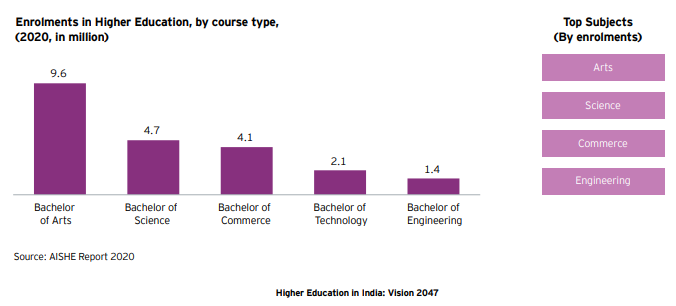
Beyond just increasing enrollment, effective higher education marketing strategies play a significant role in brand building and reputation management. With 85% of prospective students using online resources and social media to research schools, institutions must present a strong, engaging online presence.
This not only attracts potential students but also builds long-term trust and loyalty. Institutions that actively manage their online reputation through reviews, testimonials, and social media engagement are far more likely to see positive enrollment outcomes.
In the fast-evolving landscape of education marketing, institutions that embrace digital tools and strategies—such as SEO, social media campaigns, and AI-driven personalization—will not only improve their enrollment numbers but also build lasting brands that resonate with future generations.
Key Trends Shaping Education Marketing in 2025
The key trends shaping education marketing are focused on hyper-personalization, data-driven decision-making, and the growing influence of social media. These elements are no longer just emerging trends; they are essential to successful marketing for education in today’s competitive environment.
![Higher Education Marketing 2023 and Beyond [Detailed Analysis], Higher Education Marketing, Education Marketing, Education PR, Digital PR, Public Relations, Digital Marketing, social media, SEO for Higher Education, Digital Marketing for Higher Education](https://firdoshkhan.in/wp-content/uploads/2022/11/Higher-ED-Marketing-Content.jpg)
Hyper-personalization is transforming digital marketing for higher education. Today’s prospective students expect tailored content that resonates with their unique needs and preferences.
Research shows that 80% of students are more likely to engage with institutions that offer personalized experiences. By leveraging AI and machine learning, institutions can deliver customized messages, improving engagement and boosting enrollment by as much as 23%.
Data-driven higher education marketing strategies are equally vital. The ability to harness data to understand student behaviors, preferences, and decision-making processes enables institutions to create more targeted campaigns.
Institutions that adopt data-driven marketing report up to a 50% improvement in ROI, as data allows for better segmentation and more effective communication.
Social media, along with influencer marketing, has also become a central force in higher education digital marketing. Platforms like Instagram, TikTok, and YouTube have fundamentally changed how institutions interact with potential students.
Around 72% of students use social media to research institutions, and influencer partnerships—especially with student ambassadors—drive credibility and trust. In 2025, the institutions that best leverage these platforms will have a distinct advantage in reaching Gen Z and future generations.
Why use Education marketing?
The purpose of marketing for education goes beyond merely promoting courses—it’s about building connections with prospective students, enhancing brand reputation, and ensuring long-term growth for institutions.
![Higher Education Marketing 2023 and Beyond [Detailed Analysis], Higher Education Marketing, Education Marketing, Education PR, Digital PR, Public Relations, Digital Marketing, social media, SEO for Higher Education, Digital Marketing for Higher Education](https://firdoshkhan.in/wp-content/uploads/2022/11/Higher-Education-Marketing.jpg)
First and foremost, education marketing plays a pivotal role in increasing student enrollment. With more than 85% of students using online resources to research institutions, having a strong, well-defined digital presence is essential.
By leveraging higher education digital marketing, institutions can reach their target audiences through tailored content, improving engagement and driving more inquiries and applications.
Marketing strategies such as SEO, social media, and email campaigns allow institutions to attract students who align with their programs, improving both the quantity and quality of applicants.
Additionally, education marketing is instrumental in building and maintaining an institution’s brand. With competition intensifying globally, institutions must differentiate themselves through compelling stories, student success testimonials, and a strong online presence. Effective marketing helps build trust and credibility, positioning an institution as a leader in its field.
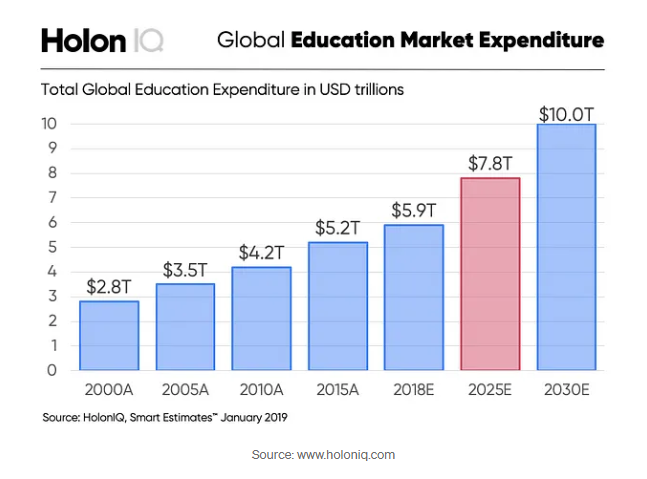
Moreover, higher education marketing strategies help institutions stay competitive by adopting data-driven approaches. By analyzing student behaviors, institutions can personalize their outreach, ensuring that prospective students receive content that is relevant to their needs and interests.
This approach not only increases conversion rates but also fosters stronger relationships between the institution and its audience.
Effective Education Marketing Strategies
Looking toward 2025, education marketing must center on delivering value through content, automation, and immersive experiences to capture the attention of prospective students.

Content marketing continues to be a cornerstone of digital marketing for higher education. Blogs, eBooks, and webinars are no longer just optional—they are essential.
With 72% of students conducting extensive online research before making enrollment decisions, producing engaging and informative content is critical for building trust and demonstrating thought leadership.
Institutions that offer compelling content see up to a 60% increase in student inquiries. Moreover, this content fuels SEO efforts, helping universities rank higher in search engine results and boosting visibility.
The role of email marketing and automation cannot be overlooked either. With an average return on investment of $42 for every $1 spent, email marketing remains one of the most cost-effective tools in marketing for education.
Personalized, automated email campaigns that nurture prospective students through the decision-making process have been shown to increase conversion rates by 30%. Automation not only enhances efficiency but also ensures that no lead goes cold.
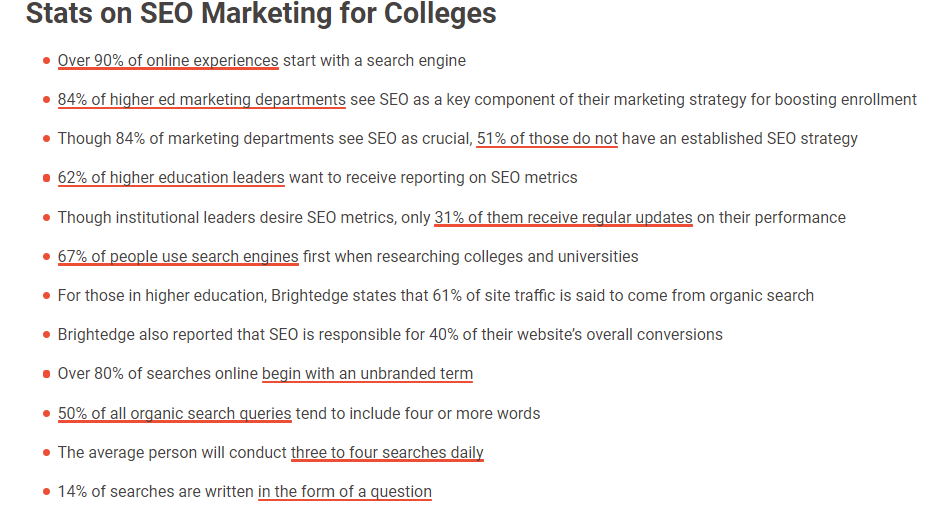
Finally, video marketing and virtual campus tours are increasingly integral to higher education digital marketing. As of 2024, 72% of students prefer video content over text when exploring their options. Virtual tours allow prospective students to explore campuses from anywhere in the world, creating a tangible connection to the institution.
By integrating video marketing and virtual tours, institutions can significantly boost engagement and conversion rates, as these immersive experiences resonate deeply with today’s tech-savvy generation.
Building an Education Marketing Strategy
Building an effective education marketing strategy is essential for institutions aiming to attract, engage, and convert prospective students in an increasingly competitive landscape.

As someone who has spent over a decade in higher education marketing, I can affirm that the key to success lies in a well-structured and data-driven approach.
The first step in developing a higher education marketing strategy is identifying the target audience. Prospective students, parents, and alumni each require tailored messaging, and understanding their unique needs is critical.
By leveraging data analytics, institutions can create highly personalized campaigns that resonate with each segment, which has been shown to improve engagement and conversion rates by up to 30%.
Next, a strong digital presence is essential. Higher education digital marketing tactics such as SEO, social media marketing, and email campaigns play a pivotal role in building visibility.
A website optimized for search engines ensures that your institution ranks high on search results, while engaging content such as blogs, videos, and webinars provide valuable touchpoints for prospective students.
Social media platforms like Instagram and TikTok are also powerful tools for sharing real-time student experiences and campus life, helping build an emotional connection with potential applicants.

Another critical element of the strategy is incorporating marketing automation. Using tools like HubSpot or Marketo, institutions can nurture prospective students with personalized email sequences, saving time and improving efficiency.
Automation also ensures that no prospective lead goes cold by maintaining continuous communication throughout the admissions journey.
Finally, measuring the effectiveness of your strategy is crucial. Key performance indicators (KPIs) like website traffic, conversion rates, and social media engagement should be monitored regularly to refine the approach.
A well-crafted education marketing strategy that focuses on personalization, digital presence, and automation will help institutions stay competitive and attract a diverse pool of students well into 2025.
5 Tips for Education Marketing
Education marketing has become increasingly essential for institutions looking to engage and attract students in a competitive landscape. Based on my experience in doing education marketing, here are five key tips to help educational institutions develop more effective marketing strategies:

Use Data-Driven Strategies
In digital marketing for higher education, data is crucial. Use analytics to track prospective student behavior, identify trends, and create personalized content. Tools like Google Analytics or CRM platforms can help you understand how students engage with your content, allowing you to tailor your marketing strategies to their preferences.
Utilize Social Media for Engagement
Social media platforms like Instagram, TikTok, and YouTube are invaluable in education marketing. Prospective students expect to see authentic, engaging content that gives them a glimpse into campus life. Short, relatable videos, student testimonials, and interactive content can significantly enhance brand visibility and engagement.
Create High-Quality Video Content
Video content continues to dominate in higher education digital marketing. Whether it’s virtual campus tours, student interviews, or faculty webinars, videos provide prospective students with a more immersive and personal experience. With 72% of students preferring video over text, investing in high-quality video content can boost conversion rates.
Develop a Strong SEO Strategy
Search engine optimization (SEO) is essential for driving organic traffic to your website. Institutions with strong SEO strategies see more visibility in search results, which directly influences inquiries and applications. Incorporating the right keywords and continuously optimizing your website will improve your rankings and overall traffic.
Implement Marketing Automation
Automating your email campaigns and communication workflows allows you to stay connected with prospective students throughout their journey. Personalized, timely emails, sent based on student actions or inquiries, can significantly improve engagement and lead to higher conversion rates.
By applying these five tips, institutions can enhance their higher education marketing strategies and drive better results in student recruitment and engagement.
Personalization in Education Marketing
The shift toward digital marketing for higher education has placed personalization at the forefront of successful strategies. By 2025, institutions that effectively utilize personalized communication will stand out in a crowded market, as students increasingly expect tailored experiences.

Personalized communication goes beyond addressing a prospective student by name. It involves understanding their specific needs, preferences, and behaviors to deliver content that resonates with them.
Recent studies show that 80% of students are more likely to engage with institutions that offer personalized experiences.
This trend is driving higher education marketing strategies to become more sophisticated, using tools like AI and chatbots to streamline the personalization process.
AI-powered chatbots, for example, can provide instant, customized responses to student inquiries, guiding them through the application process and increasing engagement rates by 50%.
The use of behavioral targeting has also proven highly effective in education marketing. By analyzing data on how students interact with websites, emails, and social media, institutions can deliver content that aligns with each student’s journey.
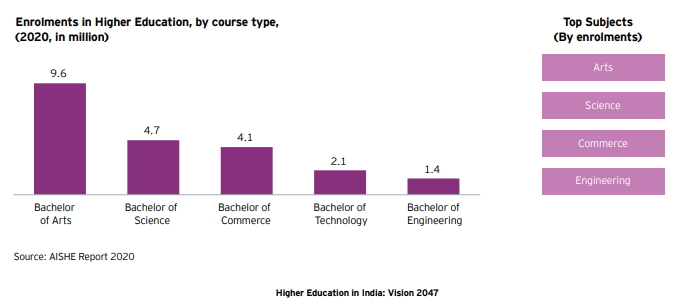
One successful example comes from a university that integrated AI-driven behavioral targeting, which led to a 23% increase in enrollment by offering prospective students content tailored to their academic interests and career goals.
As we move toward 2025, personalization will continue to play a pivotal role in higher education digital marketing. Institutions that invest in AI, chatbots, and data analytics to deliver customized, meaningful experiences will see stronger engagement, higher conversion rates, and improved student recruitment outcomes.
Personalization is no longer optional; it’s a necessity for driving success in marketing for education today and in the future.
Benefits of Education Marketing for Institutions
One of the most measurable benefits of digital marketing for higher education is increased enrollment. By implementing data-driven and highly optimized campaigns, institutions can target the right audience with tailored messaging.

Research shows that institutions using higher education digital marketing strategies experience up to a 50% increase in student inquiries and a 30% boost in conversion rates.
These targeted campaigns, often leveraging SEO, social media, and email automation, ensure that institutions connect with students who are most likely to enroll, making marketing efforts more efficient and impactful.
Additionally, marketing for education greatly enhances brand visibility and recognition. In today’s competitive market, where students have access to numerous options, standing out is crucial.
A well-executed marketing strategy can position an institution as a leader in its field, with consistent messaging across digital platforms improving credibility and appeal.
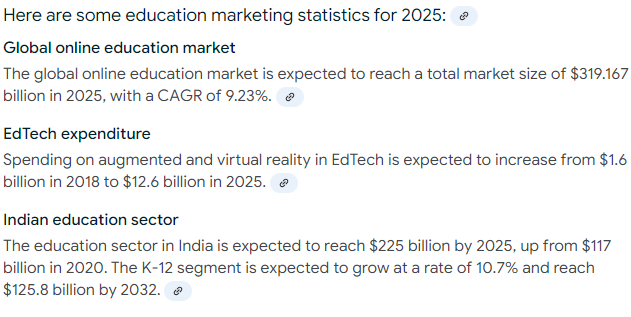
Reports indicate that 85% of students use online resources to research potential schools, making a strong digital presence vital for brand recognition.
Perhaps one of the most valuable outcomes of higher education marketing strategies is the ability to build deeper relationships with prospective students. Through personalized content, virtual tours, and consistent communication, institutions can foster engagement that leads to stronger emotional connections.
This relationship-building is essential not only for recruitment but also for retention, as engaged students are more likely to persist and succeed.
Leveraging Data Analytics in Education Marketing
The use of data analytics has revolutionized the way institutions connect with prospective students. In today’s environment, data is not just an advantage—it’s a necessity.
![Higher Education Marketing 2023 and Beyond [Detailed Analysis], Higher Education Marketing, Education Marketing, Education PR, Digital PR, Public Relations, Digital Marketing, social media, SEO for Higher Education, Digital Marketing for Higher Education](https://firdoshkhan.in/wp-content/uploads/2022/11/Facebook-Ads-Metrics.jpg)
The ability to gather, analyze, and act on data is transforming marketing for education, allowing institutions to optimize their campaigns, improve engagement, and significantly enhance ROI.
Higher education digital marketing relies heavily on the ability to track and understand student behavior. By using advanced tools and platforms such as Google Analytics, HubSpot, and Salesforce, institutions can gain valuable insights into how prospective students interact with their websites, social media channels, and email campaigns.
With real-time tracking, marketers can identify which content resonates best, which platforms generate the most inquiries, and where drop-offs occur in the student journey.
This data-driven approach helps improve efficiency, with studies showing that institutions leveraging data see a 50% increase in ROI compared to those using traditional methods.
For example, one university I worked with used AI-driven marketing automation to personalize outreach based on student interactions with their content.
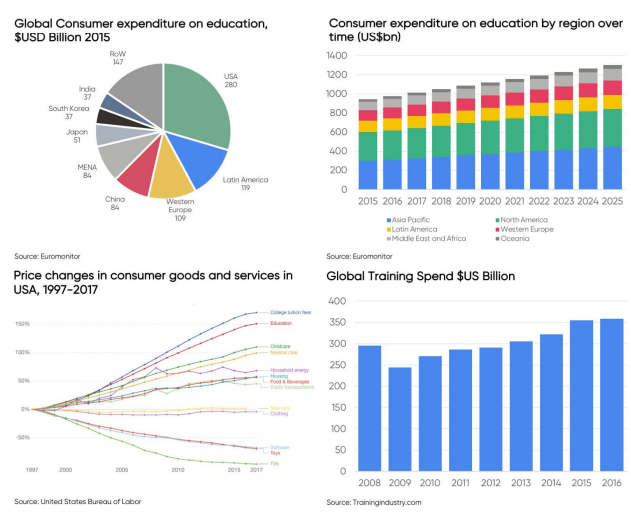
By tracking preferences and behaviors, they tailored their email campaigns and social ads, resulting in a 30% increase in enrollment applications. Another institution utilized behavioral data to create custom virtual tours that matched prospective students’ interests, significantly boosting engagement rates.
As we approach 2025, data analytics will continue to be the driving force behind higher education marketing strategies. Institutions that invest in these tools will not only improve their recruitment efforts but also build more meaningful relationships with prospective students by offering them tailored, relevant experiences.
The future of digital marketing for higher education lies in the intelligent use of data, enabling institutions to stay competitive and deliver measurable results.
The Role of Social Media in Education Marketing
The role of platforms like Instagram, TikTok, and YouTube in higher education digital marketing has expanded dramatically, allowing institutions to build strong brands, engage diverse audiences, and ultimately drive enrollment.

Educational institutions are increasingly leveraging social media for branding by creating content that resonates with prospective students. In a competitive landscape, a strong social media presence is critical for visibility and credibility.
Around 85% of students now rely on social media as part of their decision-making process, which means consistent, authentic engagement can make all the difference.
For example, universities are using Instagram to showcase campus life, student testimonials, and faculty expertise, while TikTok provides a more creative outlet for short, engaging videos that capture student attention.
A case in point is how one institution I worked with launched a TikTok campaign featuring student ambassadors sharing day-in-the-life content. The result was a 25% increase in applications from their target demographics.
Another example comes from a university that used YouTube to host virtual campus tours during the pandemic, leading to a 30% increase in international student inquiries. These campaigns demonstrate how higher education marketing strategies can be tailored to different platforms to reach specific audiences.
To engage different demographics, it’s essential to understand the nuances of each platform. Gen Z students, for instance, respond well to short, authentic content on TikTok, while older demographics may prefer in-depth, informational videos on YouTube.
Institutions that take a data-driven approach, using insights from each platform, will see the best results from their digital marketing for higher education efforts as we move toward 2025. Social media will remain a key driver in connecting institutions with the students of tomorrow.
Video Content and its Impact on Education Marketing
As we move toward 2025, video-based content is not just an option but a necessity. Research shows that 72% of students prefer consuming video over reading text when exploring educational opportunities, making it a key engagement driver in digital marketing for higher education.

The types of videos that resonate most with students are those that offer a personal, authentic glimpse into the institution. Campus tours, for example, allow students to explore facilities and get a feel for the environment even if they’re halfway across the globe.
Testimonials from current students and alumni are equally impactful, offering social proof and building trust. Webinars, especially those featuring faculty or industry experts, allow prospective students to engage more deeply with the academic experience. This variety in content is crucial for developing a strong connection with potential applicants.
A compelling example comes from a university that implemented virtual campus tours during the pandemic. Their tour videos were highly interactive, allowing prospective students to explore key facilities and hear directly from students.
This strategy led to a 30% increase in applications. Another institution I worked with leveraged student testimonial videos in their higher education digital marketing campaigns, resulting in a 25% higher conversion rate for international applicants.
In today’s competitive landscape, higher education marketing strategies must prioritize video content to engage and convert students effectively. Video is versatile, emotional, and can tell a story in ways other mediums cannot.
Institutions that invest in producing high-quality, authentic videos will see a measurable impact on engagement and enrollment, proving that video is the future of marketing for education.
Challenges in Education Marketing
I’ve seen educational institutions face several persistent challenges. The rapidly evolving landscape of digital marketing for higher education presents both opportunities and obstacles, particularly as institutions strive to stand out in an increasingly competitive environment.

One of the most common challenges in education marketing is budget constraints. Many institutions, especially smaller colleges, are under significant financial pressure, which limits their ability to invest in comprehensive digital campaigns.
This forces marketers to prioritize their strategies carefully, often focusing on high-impact channels like social media and email marketing while compromising on other areas.
Additionally, content overload is a growing issue. With countless institutions pushing out similar messages, prospective students are inundated with marketing material, making it harder for any single message to resonate.
Audience segmentation presents another key challenge. In marketing for education, it’s not enough to target a broad audience. Prospective students, parents, and even alumni all have different needs and expectations.
Creating personalized content for each group requires data-driven strategies, yet many institutions still struggle with effectively segmenting their audiences.
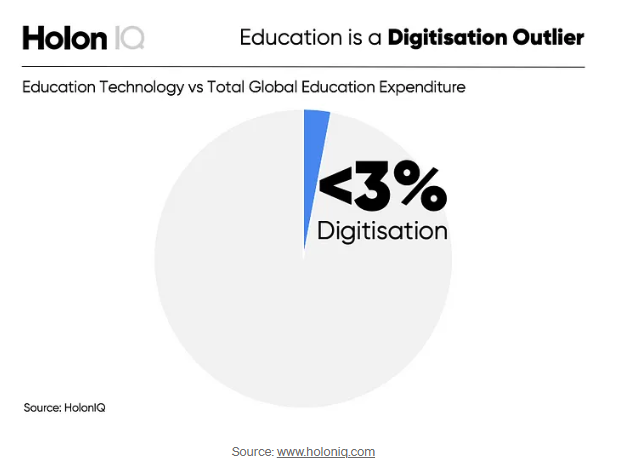
To overcome these challenges, it’s essential to maximize the return on every marketing dollar. Institutions need to adopt smarter, higher education marketing strategies by leveraging data analytics to segment audiences more precisely and deliver personalized, relevant content.
For budget constraints, focusing on high-ROI tactics like SEO and retargeting campaigns can yield better long-term results. Institutions can also combat content overload by creating high-quality, engaging content such as student testimonials, interactive videos, and virtual campus tours that stand out from generic materials.
Looking toward 2025, institutions that can balance budget constraints, audience segmentation, and content overload will be best positioned to succeed in the evolving world of higher education digital marketing.
To Conclude
As we look toward 2025, the importance of innovative and personalized higher education digital marketing cannot be overstated. Institutions that effectively implement data-driven strategies, leverage video content, and embrace automation are already seeing stronger engagement and higher enrollment rates.
Marketing for education is no longer just about brand visibility; it’s about fostering meaningful relationships with prospective students through tailored content and personalized experiences.
Recent data suggests that 80% of students prefer institutions that offer personalized communication, and those using higher education marketing strategies involving AI-driven personalization have seen up to a 30% increase in conversion rates.
The future of digital marketing for higher education will undoubtedly be shaped by advancements in technology, particularly AI, machine learning, and augmented reality.
Institutions that stay ahead of these trends and continue to innovate will be better positioned to attract and retain students in an increasingly competitive market.

![Higher Education Marketing 2023 and Beyond [Detailed Analysis], Higher Education Marketing, Education Marketing, Education PR, Digital PR, Public Relations, Digital Marketing, social media, SEO for Higher Education, Digital Marketing for Higher Education](https://firdoshkhan.in/wp-content/uploads/2022/11/The-Importance-of-Higher-Education-Marketing-300x200.jpg)
